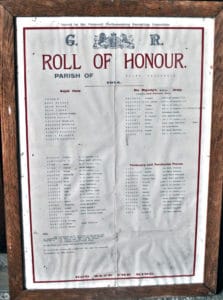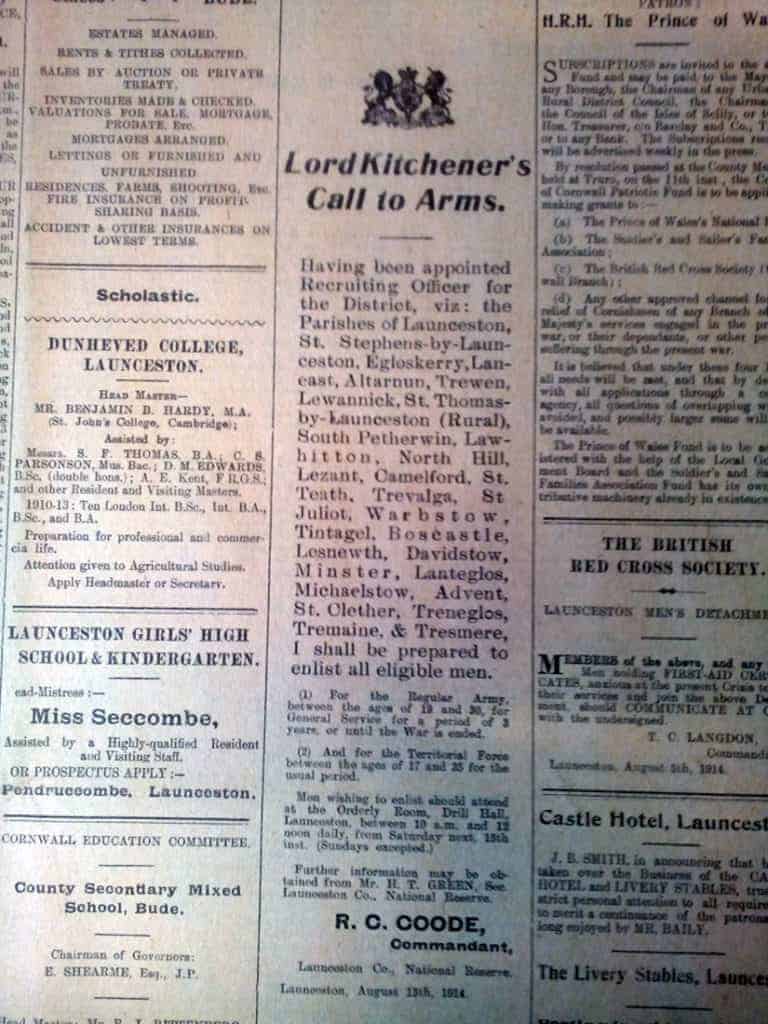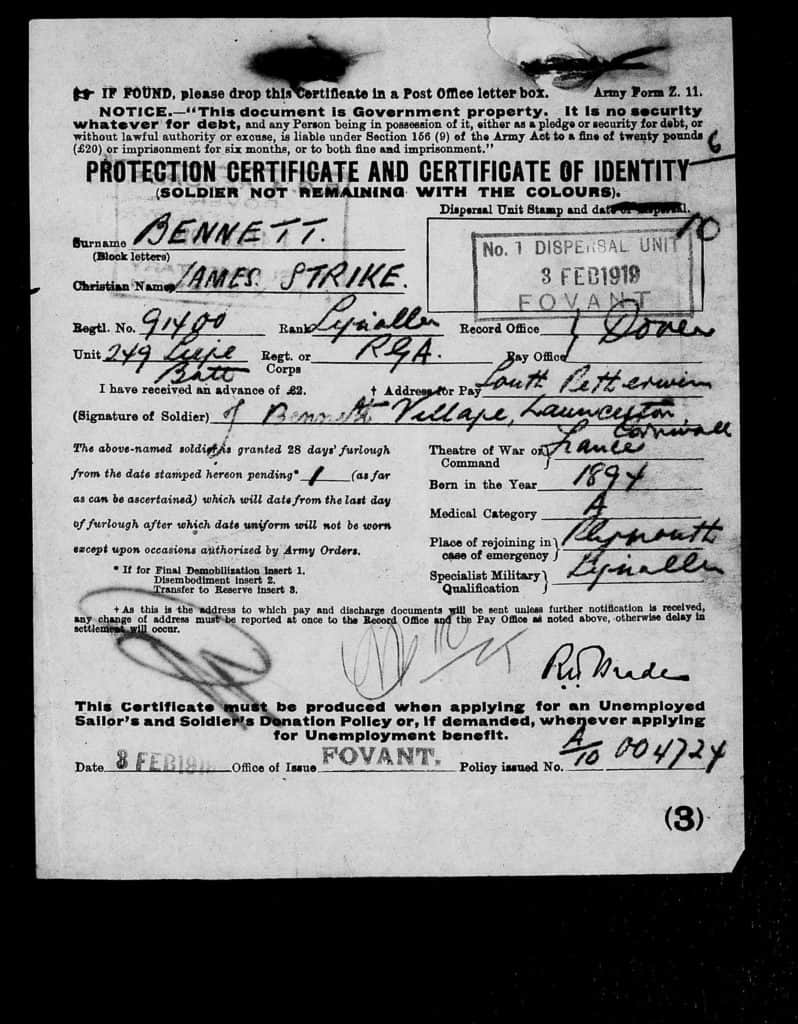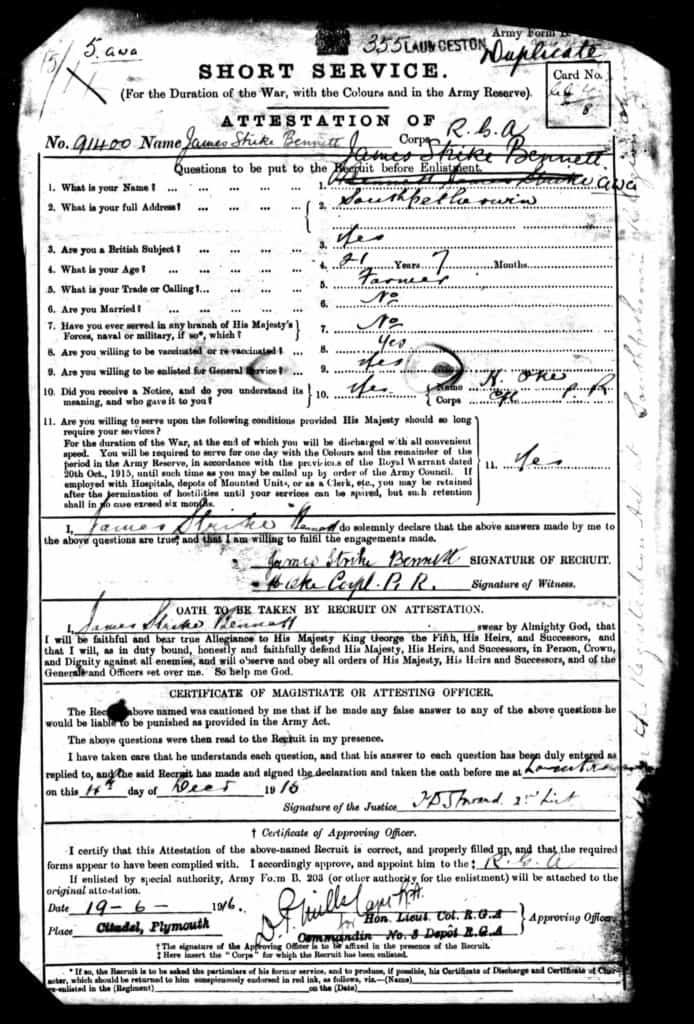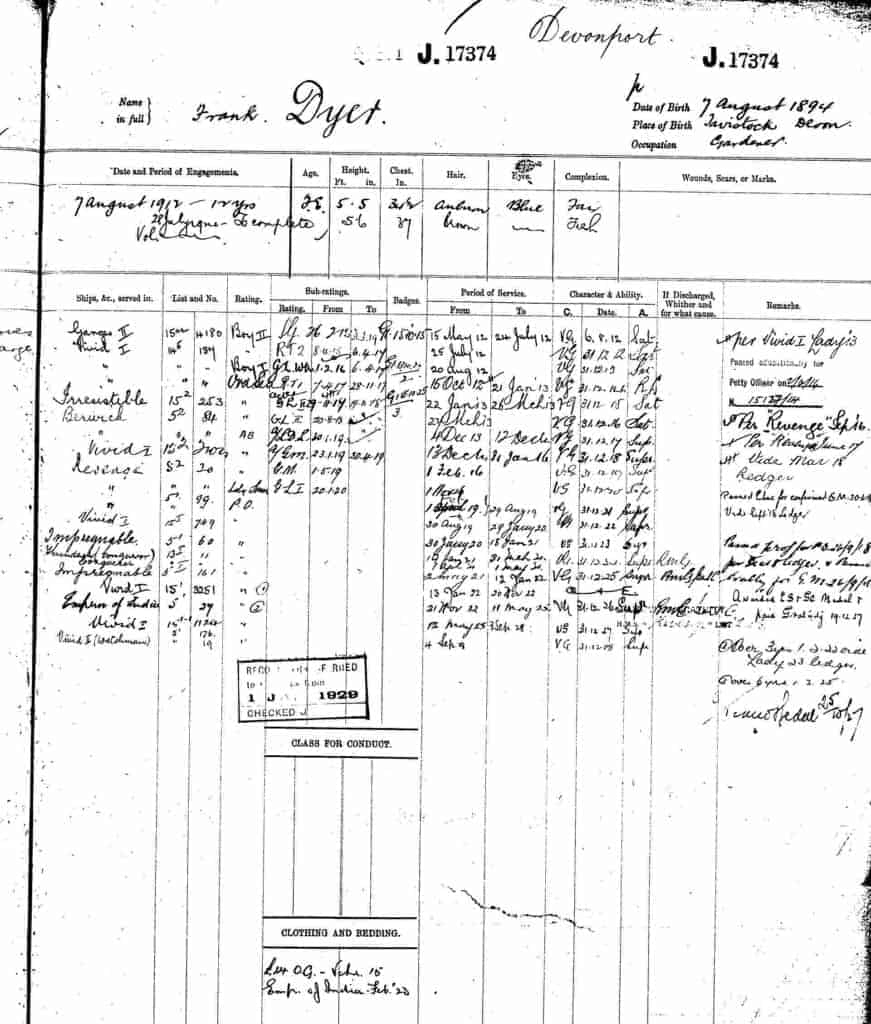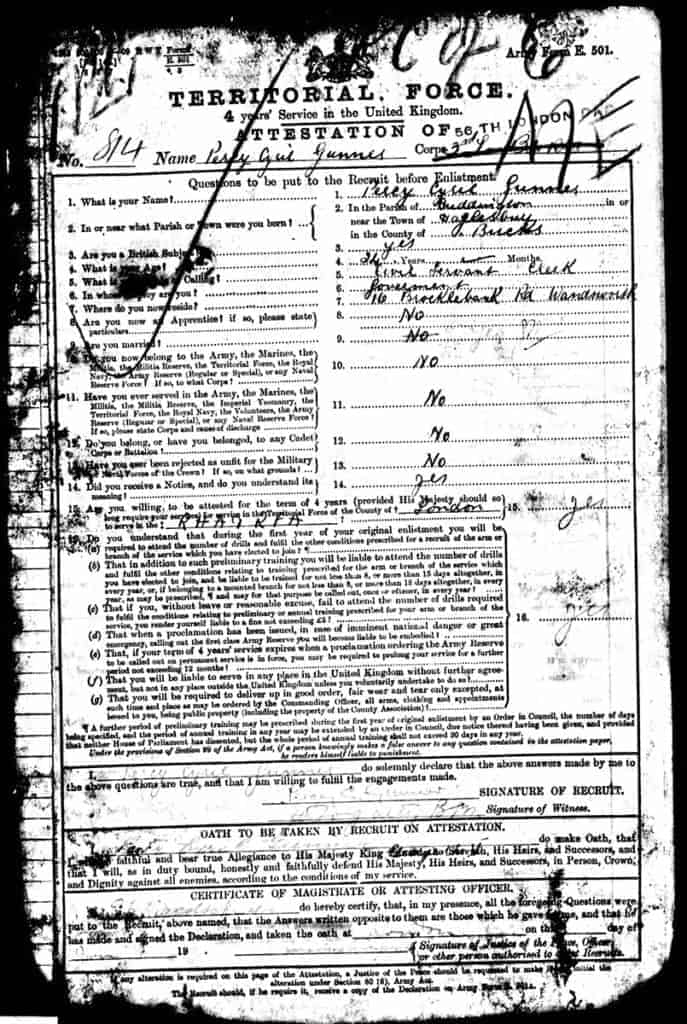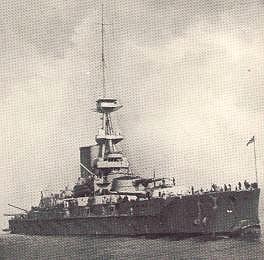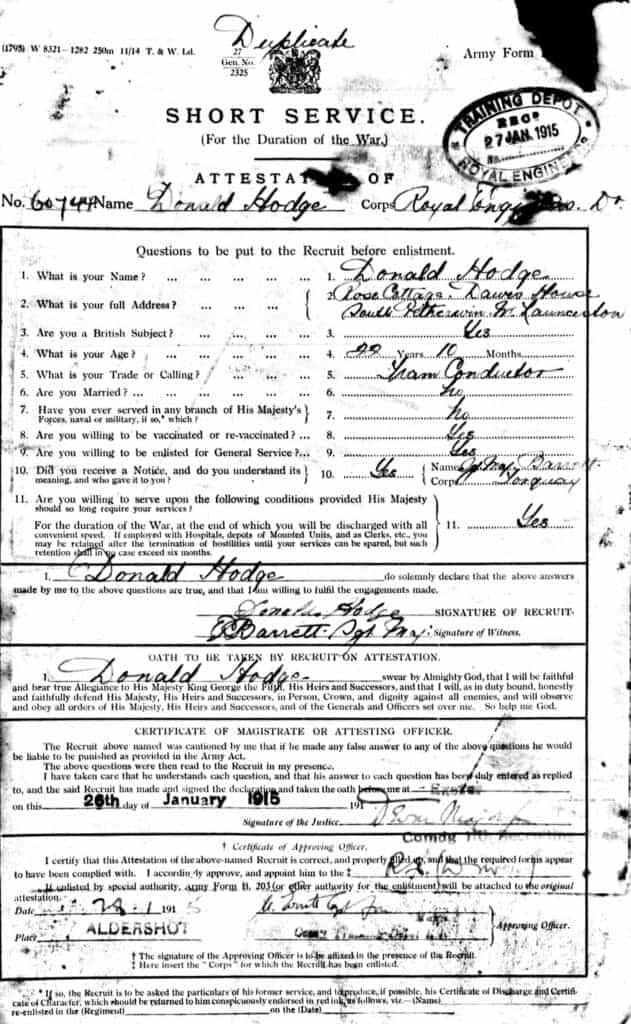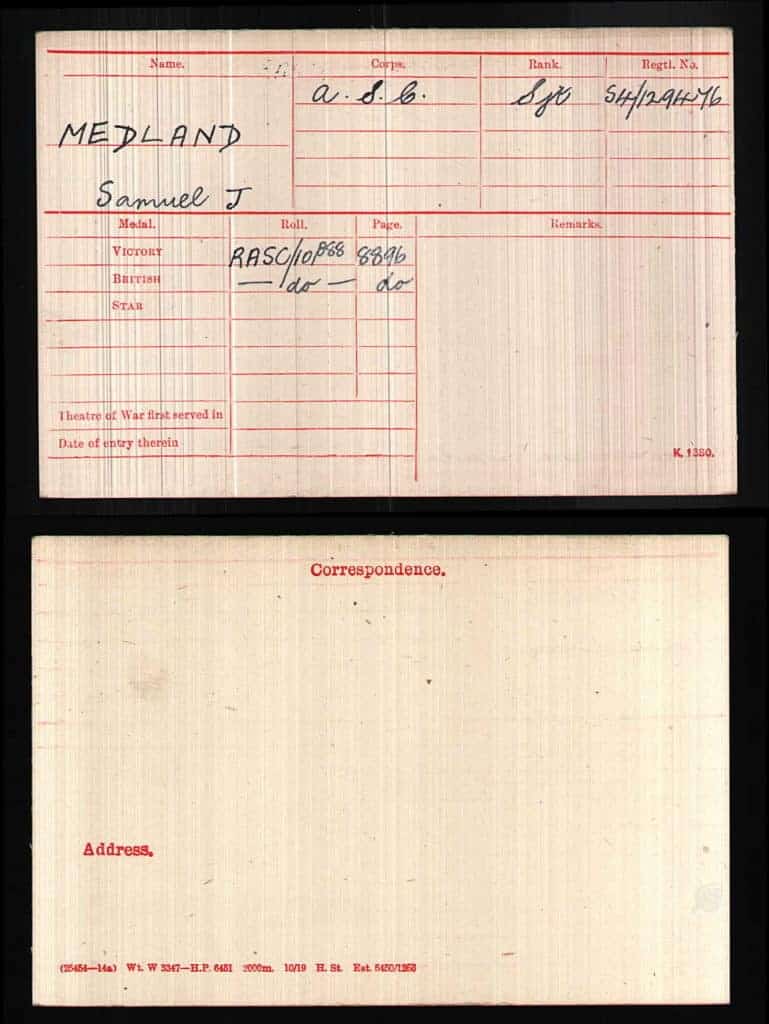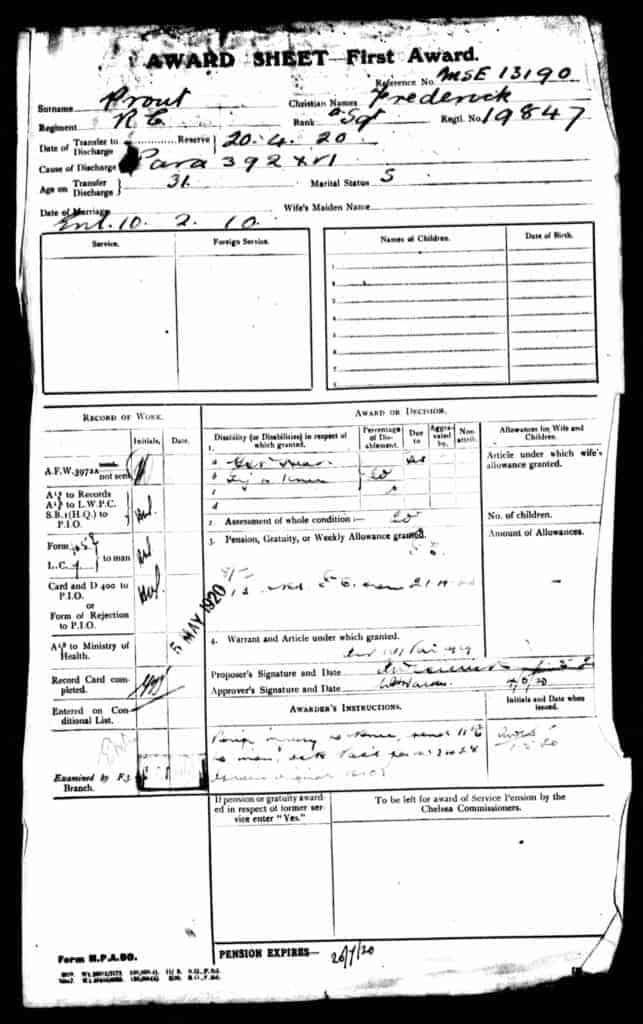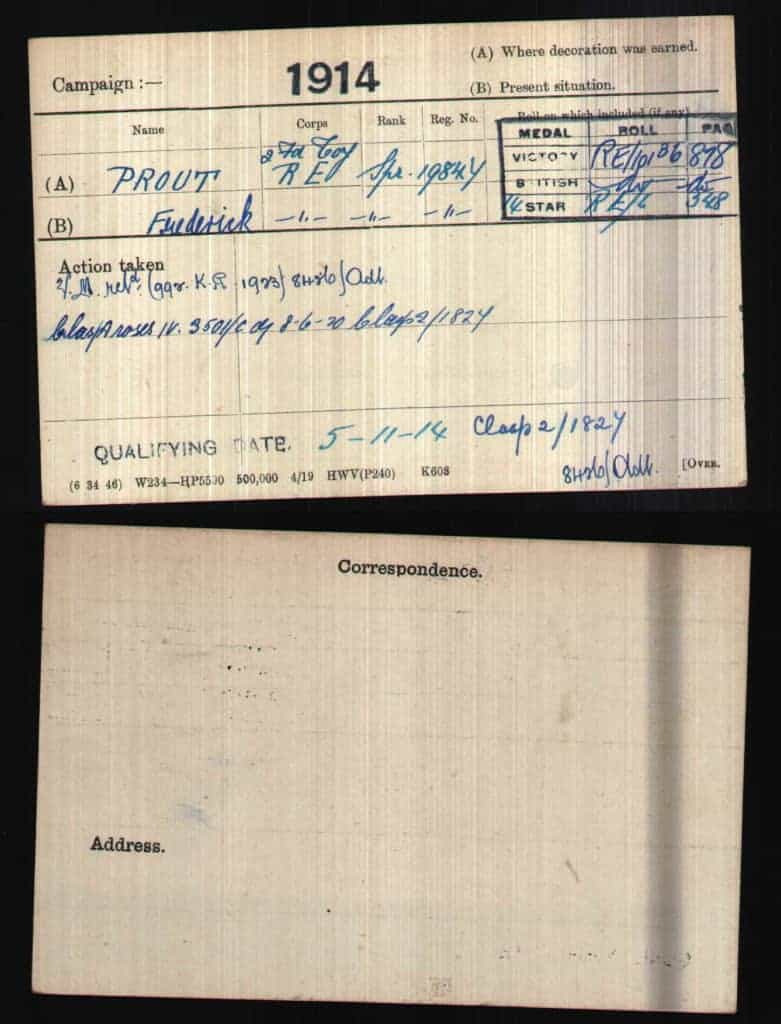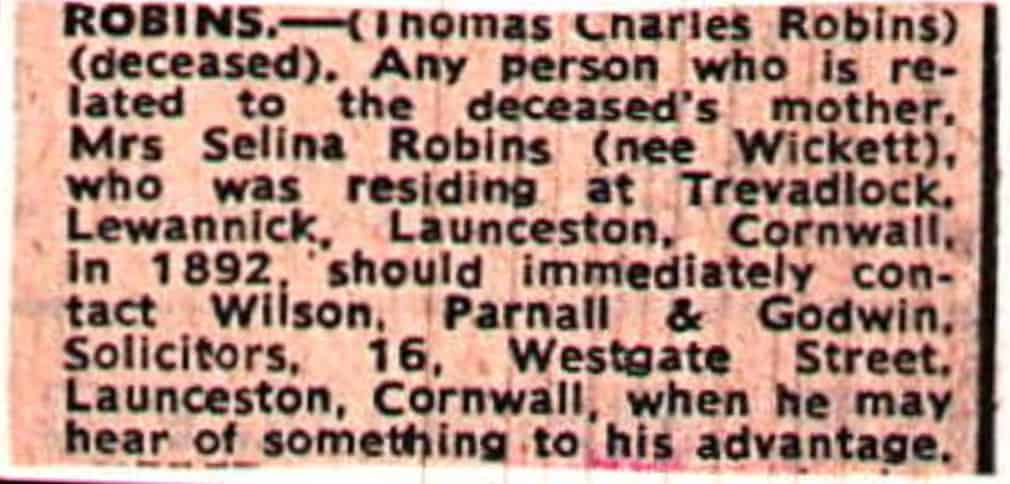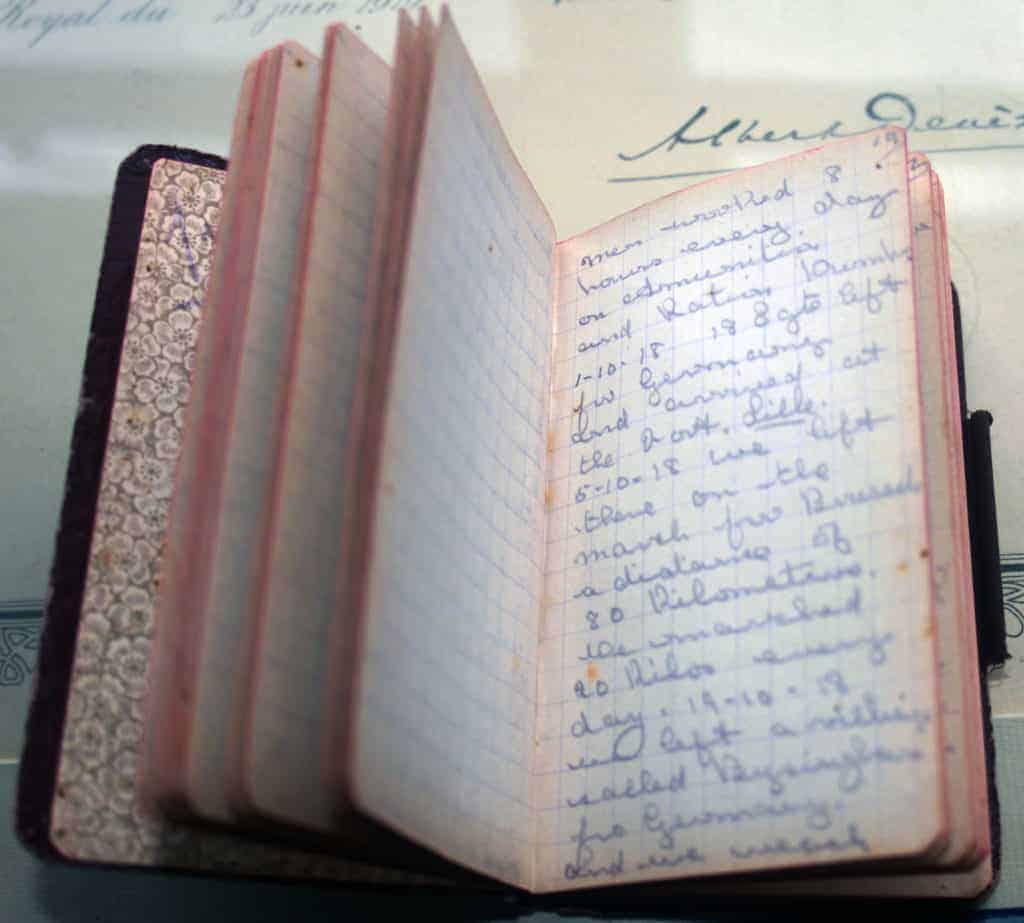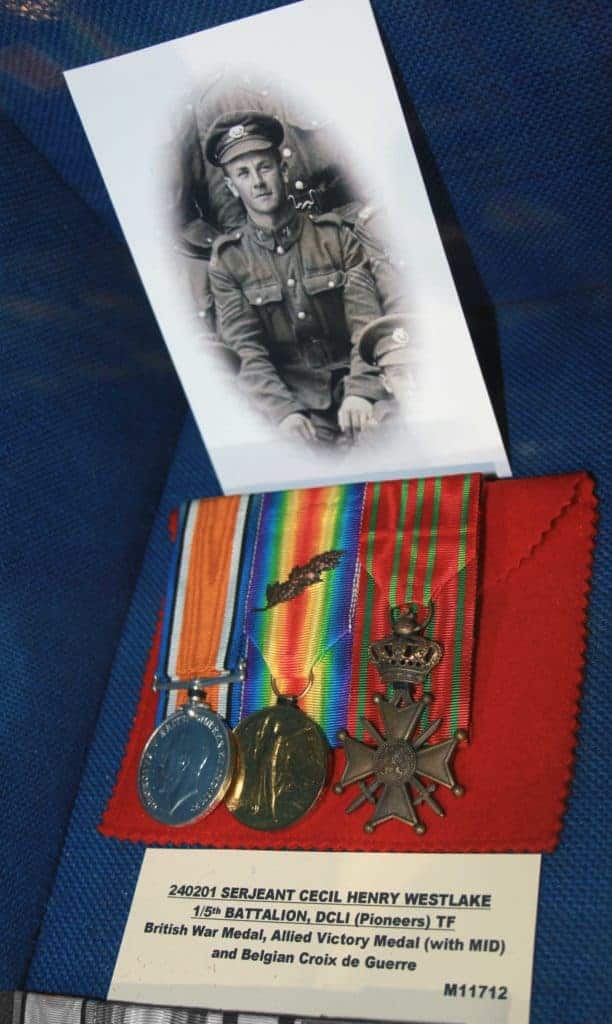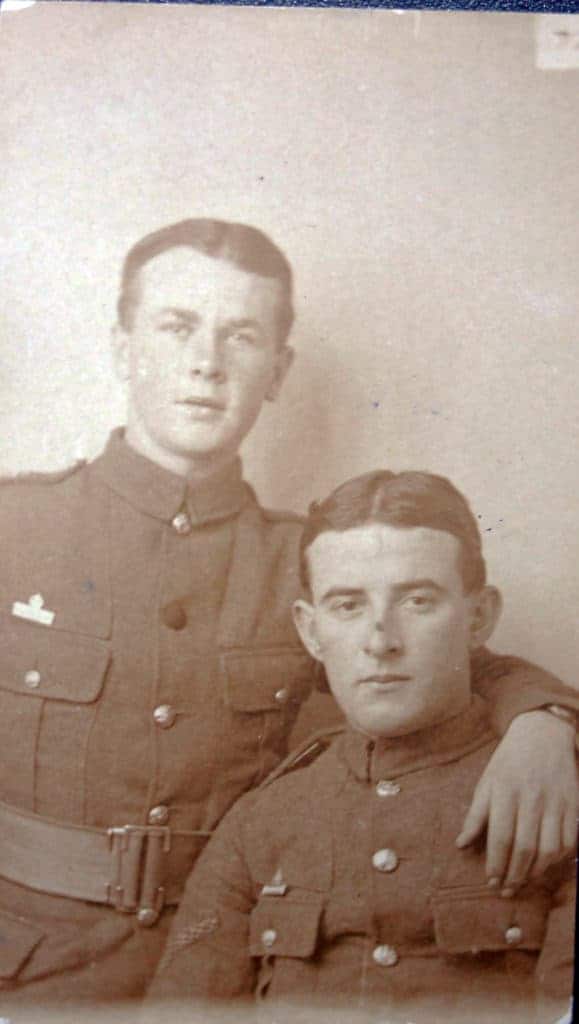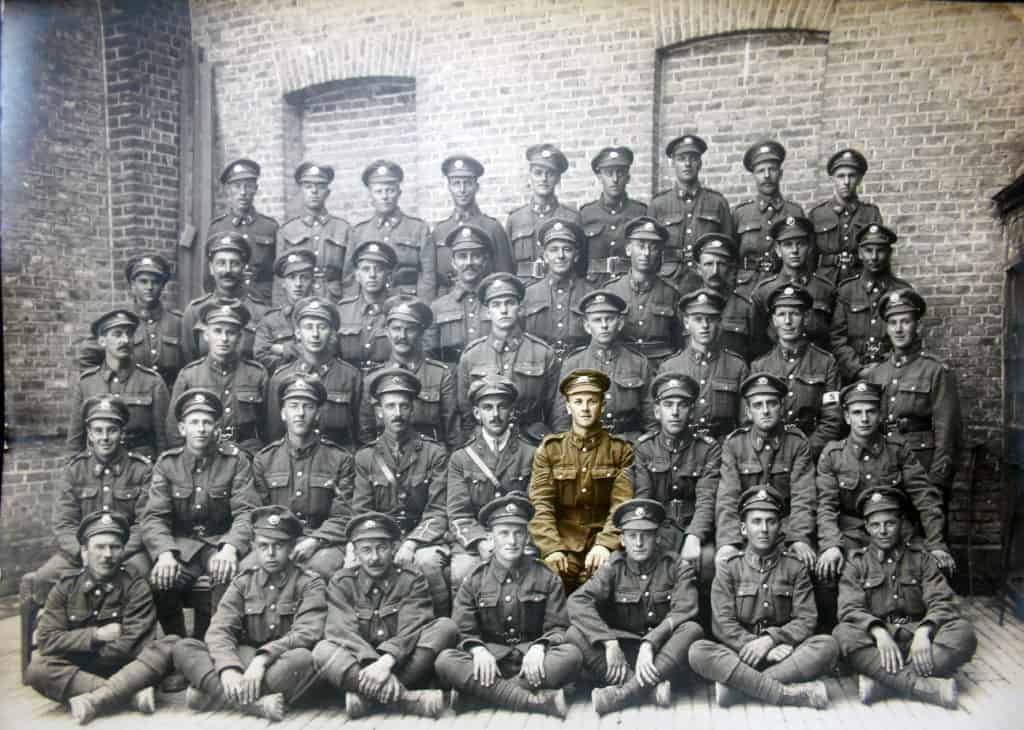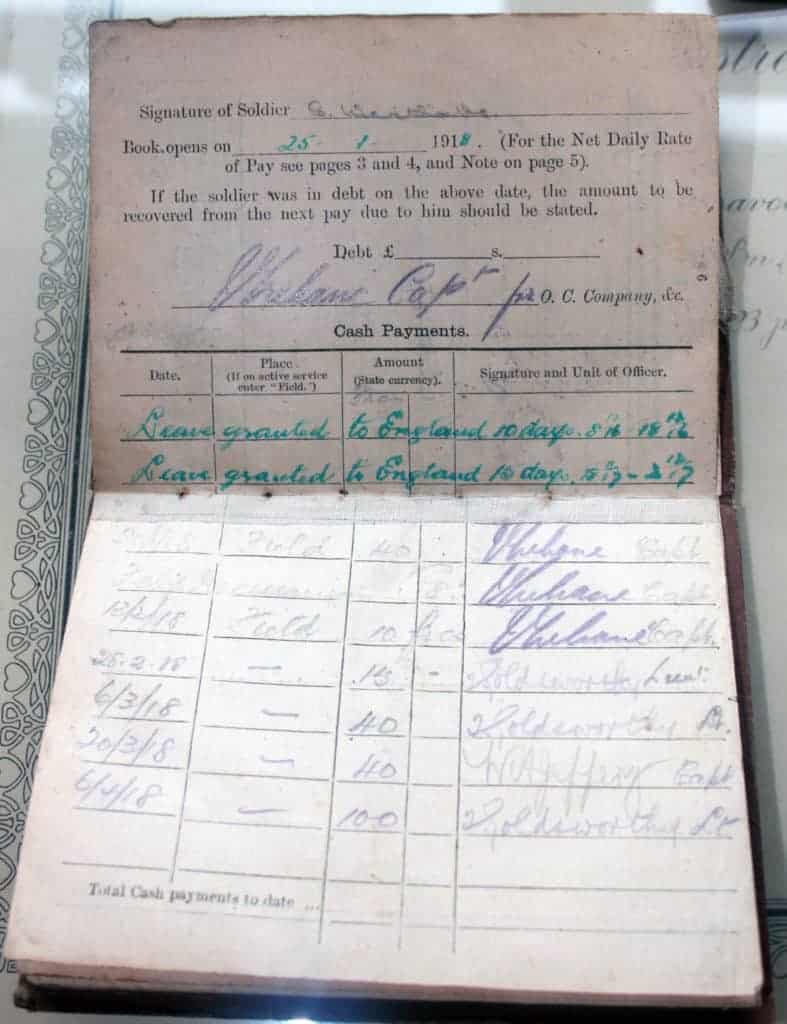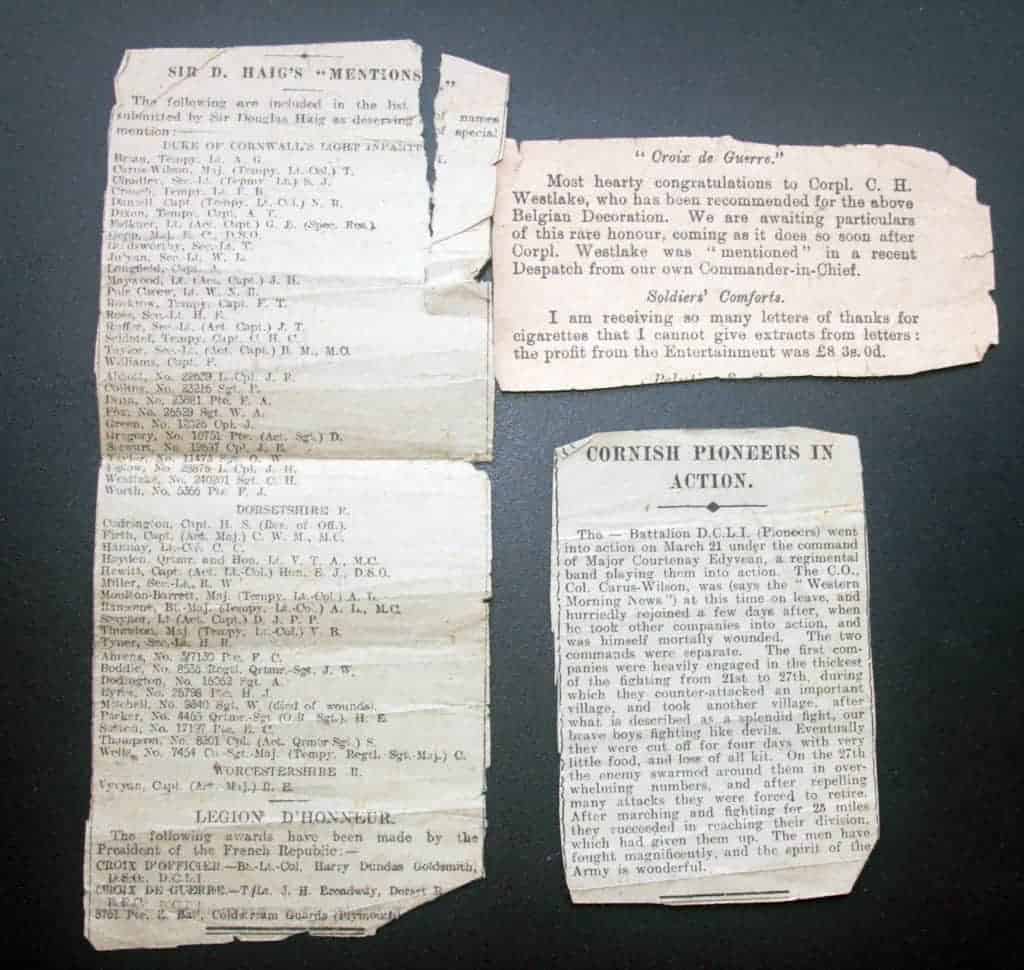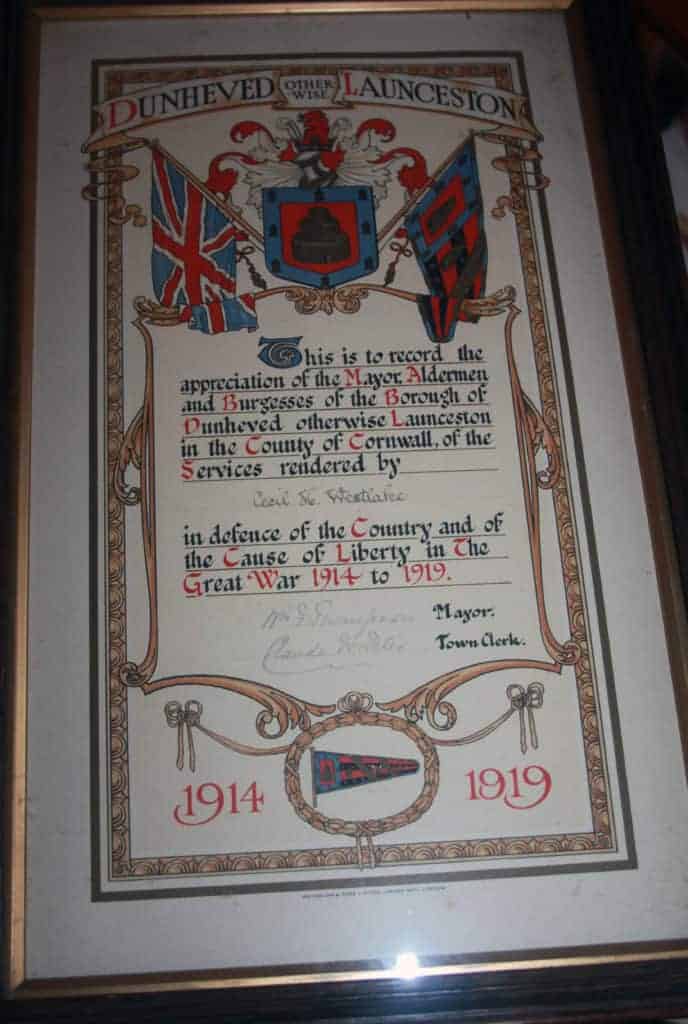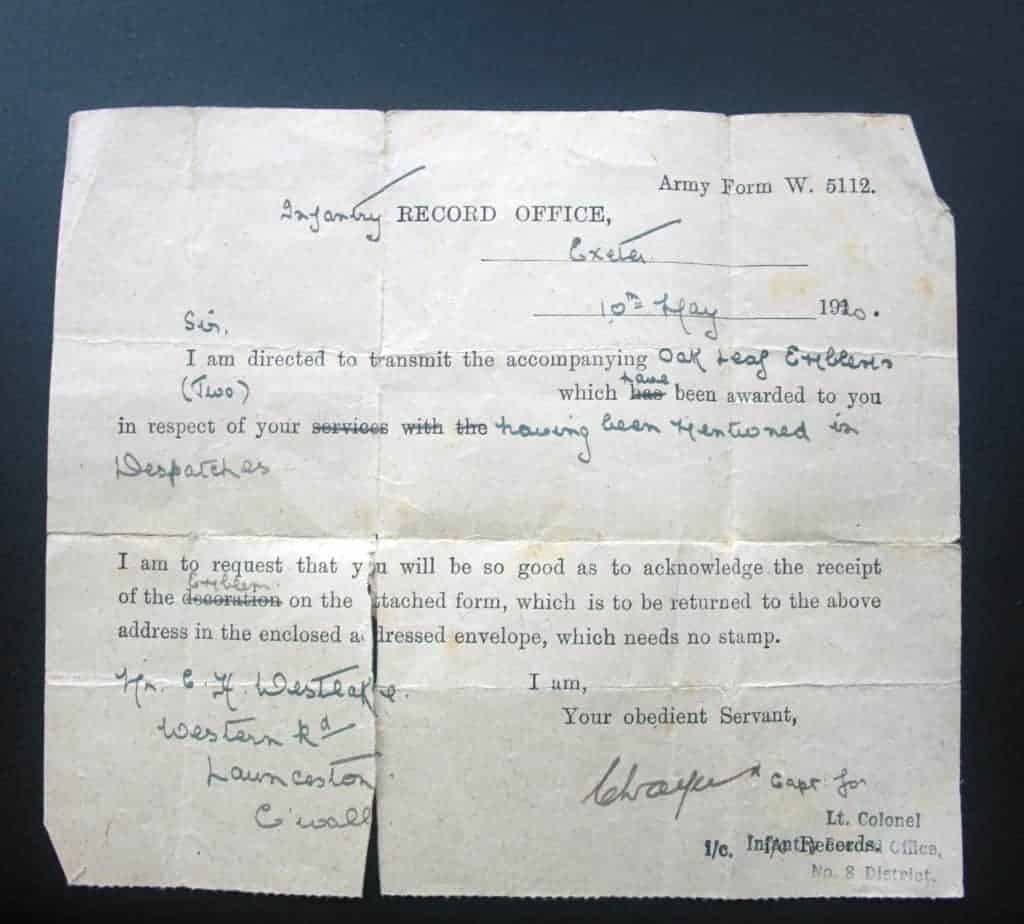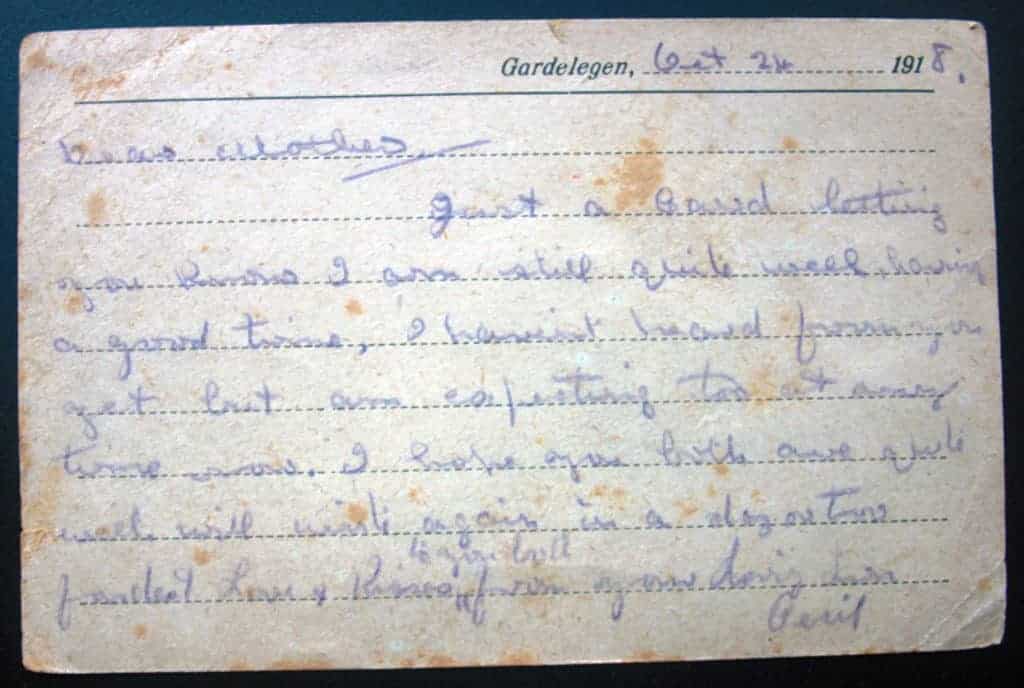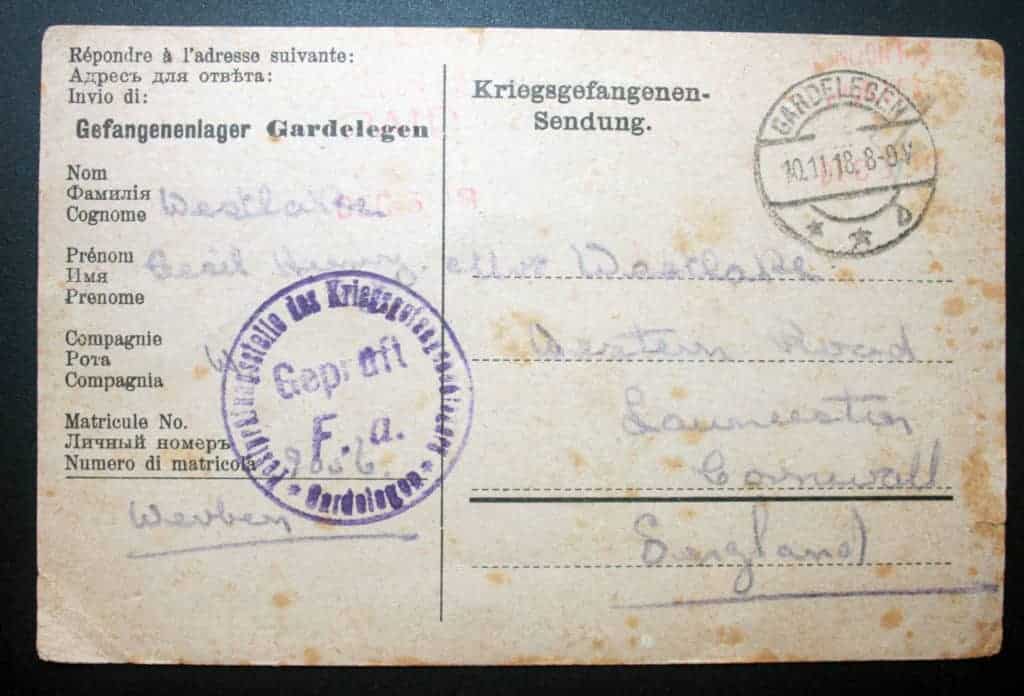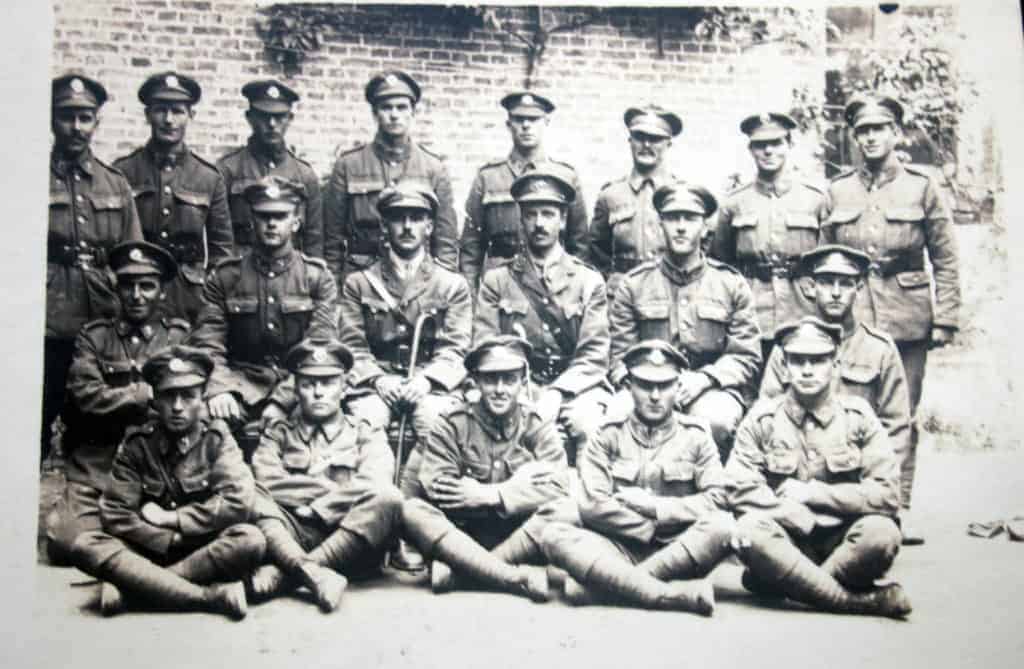This page is dedicated to all those that served in the First World War and who survived.
Below is an enlistment cutting from the Cornish and Devon Times 1914.
W. Adams (Royal Navy)
There is no surviving record of his war service.
Ernest Ball 1884-1919
Ernest was born at East Petherwin Cottage, South Petherwin on the 2nd April 1884 to James and Kitty Ball. He had 7 siblings in total. His Father was an Agricultural Labourer and in 1891 the family were living in Vicarage Road, South Petherwin. On leaving school, Ernest himself became a Farmers Labourer working for Mr. Charles Warring at Pennygillam Farm, Launceston.
He enlisted with the Royal Navy (214149) in 1902 on a 12 year service contract as a Stoker. During his career he served aboard many ships but his last ship was ‘HMS Powerful’ (below).
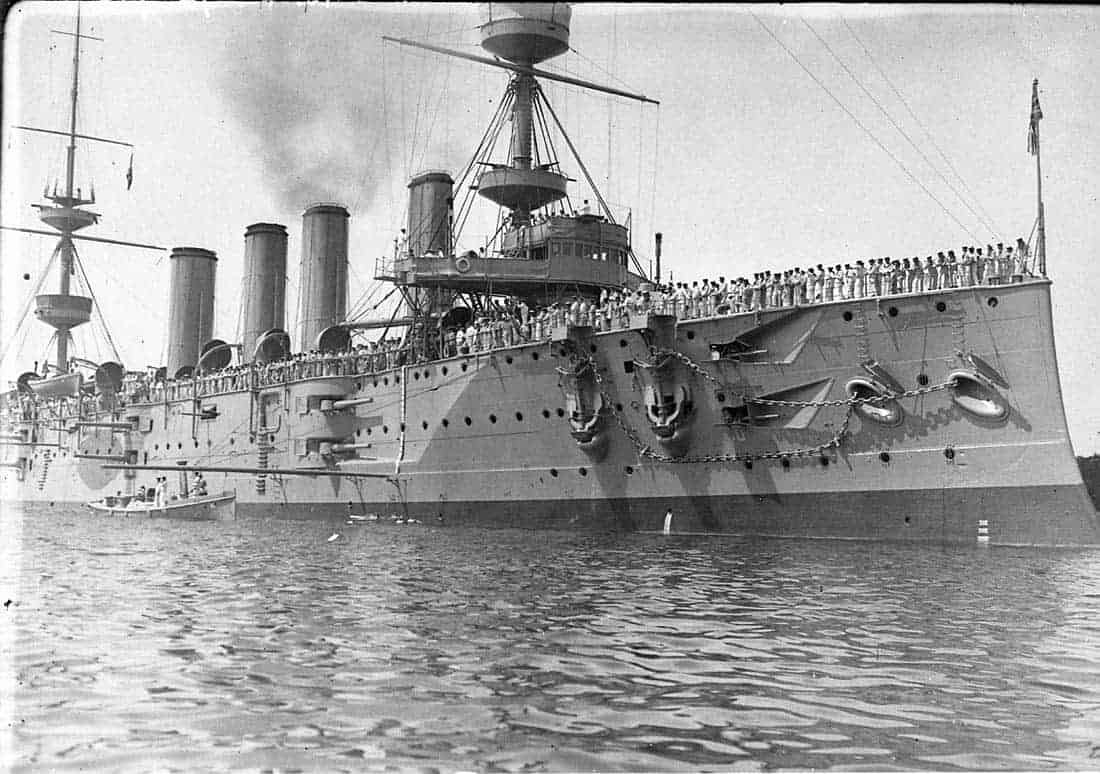
Having served his full 12 years it appears that he left the Royal Navy on the 1st of April 1914 and there is no record after that date. He passed away in 1919
William G. Bate 1898-
William was born in 1898 at Lawhitton to William and Sarah Bate. The family moved to live at Churchtown, South Petherwin and his father worked as a horseman on a farm. William enlisted with the Devonshire Regiment serving in the 7th Battalion.
Charles Bickle 1874-1943
Charles was born in 1874 to John and Emily Bickle in Launceston. His Father a General Labourer, died when Charles was 11. On leaving school, Charles worked as a Mason. He married Blanche Goodman in 1902.
He joined the DCLI as a private (15774) enlisting at Launceston on the 7th of September 1914. He was soon transferred to the 6th Battalion of the Royal Irish Fusiliers (13796) and took up training in Dublin. However after 3 months he was discharged due to having ametropia in his eyes which made it difficult to focus. He returned to Launceston where he died in December 1943.
James Strike Bennett 1893-1973
James ‘Jim’ was born on the 15th of May 1893 to Thomas and Ellen (nee Strike) Bennett in South Petherwin. His Father who was a mining engineer died before 1911 by which time Jim was working as a General Farm Labourer. He joined up with the Royal Garrison Artillery (Regimental No 91400) in December 1915 at Launceston. In 1916 he qualified as a Signaller.
At the end of the 19th century the Royal Garrison Artillery, which was part of the Royal Artillery, was divided into 3 Divisions. The uniform of Garrison Artillery was the same as Field Artillery except that they were more likely to wear trousers instead of boots and breeches. On their shoulder straps were the initials of the name of their Division and the number of their company. The RGA developed from fortress-based artillery located on British coasts. From 1914 when the army possessed very little heavy artillery it grew into a very large component of the British forces. It was armed with heavy, large calibre guns and howitzers that were positioned some way behind the front line and had immense destructive power.
He was demobilised on the 2nd of March 1919. He died in 1973 at Launceston and is buried with his Mother Ellen at St. Paternus Church, South Petherwin.
Richard Bennett 1893-
Richard was born in 1893 to William and June Bennett at Churchtown, South Petherwin. His father was the quarry foreman at Bangors Quarry, South Petherwin. At the outset of the First World War Richard enlisted with the Duke of Cornwall Light Infantry serving with the 10th Battalion.
Alfred Herman Cheeseworth 1897-1965
Alfred was born in the April of 1897 to Thomas and Ellen Cheeseworth at South Petherwin. His father was a poultry dealer. At the onset of the First World War Alfred enlisted with Duke of Cornwall Light Infantry serving with the 11th Battalion.
W. Conibeare
Served with the Royal Field Artillery.
William Coombe 1890-1956
William was born in 1890 at Beardon Mill, Boyton to James and Mary Coombe. His Father was a farm labourer but died sometime between 1899 and 1901 and the family moved to an address in Angel Hill, Launceston.
In the 1911 Census he was working for Richard Turner at Botathon, South Petherwin as a Waggoner. On the 7th September 1914 at Launceston he enlisted with the Duke of Cornwall’s Light Infantry as a Private 15788.

He died at Bodmin in 1956.
Charles Cory 1893-1969
Charles was born on April 9th, 1890 to William and Elizabeth Cory at Fore Street, Lifton. His father was a butcher /slaughter man. He followed in his father’s trade in becoming a butcher and after his father passed away he along with his mother and sister Mary, moved to live at Holyrood, Daws House. At the onset of the First World War he enlisted with the Devon Yeomanry (Regimental no. 505190) serving the whole war as a private.
He survived the war and in the March of 1920 Charles married Vera M Baskerville at Launceston. He passed away in September 1969 at Exeter.
Frank Duke 1887-1933
Frank was born in 1887 at St. Stephens, Launceston. He was a farm labourer at Rockwell Farm, Yeolmbridge in 1911.
Frank enlisted with the DCLI on the 7th September 1914 as a Private 15797.
He married Alice Drew in 1915 . They had two children with the eldest a daughter dying as an infant. Frank Died in 1933. I cannot trace any connection to South Petherwin but have never the less included Frank in this tribute as is fitting for a man that served his country for the duration of the war.
Frank Dyer 1894-1963
Frank was born on the 7th of August 1894 at Horrabridge, Devon to Henry and Eliza Dyer. Like his Father, Frank became a Gardener at Trebursye Manor, with the family residing at a cottage in Trebursye. Frank enlisted in the Royal Navy as an able Seaman (service number J17374 )in 1902.
He went on to serve past his 12 years finally being discharged on the 1st of January 1929. He served upon many ships during his career but a greater majority of his war years were spent upon HMS Revenge (below right).
James Fuge 1882-1921
James was born on the 10th May 1882 at Lewannick to James and Mary Ann Fuge. James joined the Royal Navy at an early age. (297278) His Father a retired Farmer moved to South Petherwin.
He survived the war and continued his Naval career as a mechanic, however whilst serving at HMS Vivid II he fell ill. He died of Scarlet fever and pneumonia on the 6th August 1921 in Plymouth.
(In WW1, specifically 1914 – 1915, Vivid II was an ‘Accounting Base’ at Devonport. There were several Vivid’s at the time, Vivid III was an ‘Accounting Section’ also at Devonport Sep 1917 – ~ Dec 1918, Vivid IV was an ‘Accounting Base’ at Falmouth around that time and Vivid V was another ‘Accounting Base’ at Milford Haven c.1919.)
Harold Henry Gillbard 1889-1961
Harold was born in 1889 to John and Mary (nee Creeper) Gillbard at Pollinick, South Petherwin. His father was a farmer. On leaving school, Harold went and worked on at the family farm of Pollinick.
There is little known of his military record only that he enlisted at the onset of the First World War and his name appears on the St. Paternus ‘Roll of Honour.’
He passed away in the June of 1961 at St. Germans, Cornwall.
Charles Edward Gillbard 1892-1980
Edward, as he was known, was born on June 7th, 1892 to John and Mary (nee Creeper) Gillbard at Pollinick, South Petherwin. His father was a farmer. On leaving school, Edward went and worked on at the family farm of Pollinick.
There is little known of his military record only that he enlisted at the onset of the First World War and that he joined the 1st Devonshire yeomanry. His name also appears on the St. Paternus ‘Roll of Honour.’
He passed away in the March of 1980 at Launceston.
Sidney Gregory
Sidney served with the 5th Battalion of the D.C.L.I.
William Gregory 1898-
William was born in 1898 at Warbstow to William and Harriet Gregory. In the 1911 Census he was working as a Cowboy for Annabella Langman at Tregillis Farm, South Petherwin. In 1914 he enlisted with Duke of Cornwall’s Light Infantry serving as a Private.
Percy Gunner 1887-1952
Percy was born in 1887 to John and Bessie Gunner at Cuddington, Buckinghamshire. He was the elder Brother to Harold Gunner who was killed serving in the war. His Father was the School Teacher for South Petherwin. By 1911 he was a Clerk in the Civil Service boarding with William Gough and his family at 16 Brocklebank Rd, Wandsworth. At the onset of the war in August 1914 he married Marie Emily Glover (below) a marriage that gave them two Children.

His military career began when he joined the R.F.A (TF) in 1911 as a Bombardier ( Regimental No. 814) rising through the ranks to finish as a Battalion Quarter Master Sergeant with the 56th D.A.C by the end of the war.
He left the military in March 1919 and returned to work in the Civil Service.
He died in December 1952 living in Sussex.
Alphonso Harris 1886-1925
Alphonso was born in 1886 to John Grigg and Mary Harris in South Petherwin Village. He had three sisters and two brothers. Alphonso’s Father was a Carpenter. Alphonso joined the Royal Navy as a boy and was shown to be in the Naval Hospital at East Stonehouse, Plymouth in the 1901 census. In the 1911 census he was serving aboard the HMS Cambrian as an able seaman. He was serving aboard HMS Illustrious when war broke out but was transferred to HMS Erin (below right) on the 12th of August 1914. Erin had originally been built for the Ottoman Navy (being named the Resadive) and was about to be handed over to the Turks when, on the orders of Winston Churchill it was seized for use by the Royal Navy.
However, by the 9th of September, Alphonso fell ill and was taken off ship and by the 9th of December 1914 he was invalided out of the Royal Navy with Pulmonary Tuberculosis.
He died in 1926, probably due to the TB, and is buried in St. Paternus Churchyard along with his parents.
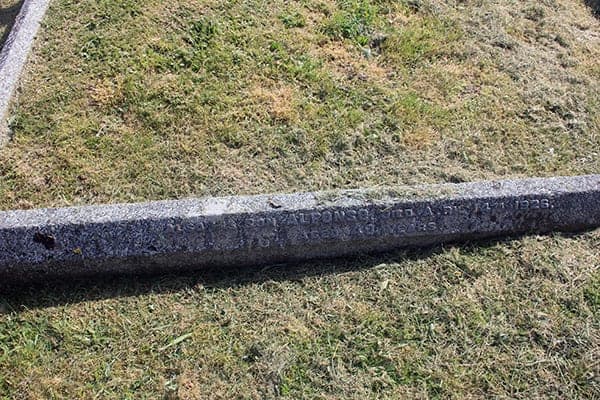
Henry Harry
Henry served with the 9th Battalion of the D.C.L.I.
William Tickle Harris 1877-1955
William was born on March 2nd, 1877 to Nathaniel and Jane (nee Jordan) Harris at Lezant. His father worked as an agricultural labourer with the family living at Landlake, South Petherwin. On leaving school, William went to work as an agricultural labourer for Mr. John Rawling of Oldwit Farm. He joined the Royal Navy (service no. 284078) on December 7th 1896, enlisting initially for a 12 year period. He trained at Vivid II as a stoker. His first ship that he served upon was the HMS Peacock which was a composite screw gunboat launched in 1888. Periods aboard Triumph, Donegal, Cambridge, and Hague were served before, in 1906, William gained promotion to Stoker Petty Officer when he was serving aboard the depot ship HMS Blake. Periods served in Gibraltar followed before the outbreak of the First World War when he was serving aboard HMS Duke of Edinburgh. By now having been promoted to Chief Stoker.
HMS Duke of Edinburgh was stationed in the Mediterranean when the First World War began and participated in the pursuit of the German battlecruiser SMS Goeben and light cruiser SMS Breslau. After the German ships reached Ottoman waters, the ship was sent to the Red Sea in mid-August to protect troop convoys arriving from India. Duke of Edinburgh was transferred to the Grand Fleet in December 1914 and participated in the Battle of Jutland in May 1916. She was not damaged during the battle and was the only ship of her squadron to survive. She was eventually transferred to the Atlantic Ocean in August 1917 for convoy escort duties.
William saw out the rest of his service with the Royal Navy at Vivid II and finally aboard HMS Resolution before he was demobilised on July 29th, 1919.
He returned to live at Launceston where he passed away at the age of 78 in December 1955.
William Heddon 1899-1922
William was born around 1899 to Richard and Jane Heddon (nee Hicks) of Guest Corner, South Petherwin. His Father was a farm labourer. He joined the DCLI as a Private 1686 . Although he survived the war, he died just 4 years after the armistice on the 24th of January 1922 whilst still living in South Petherwin.
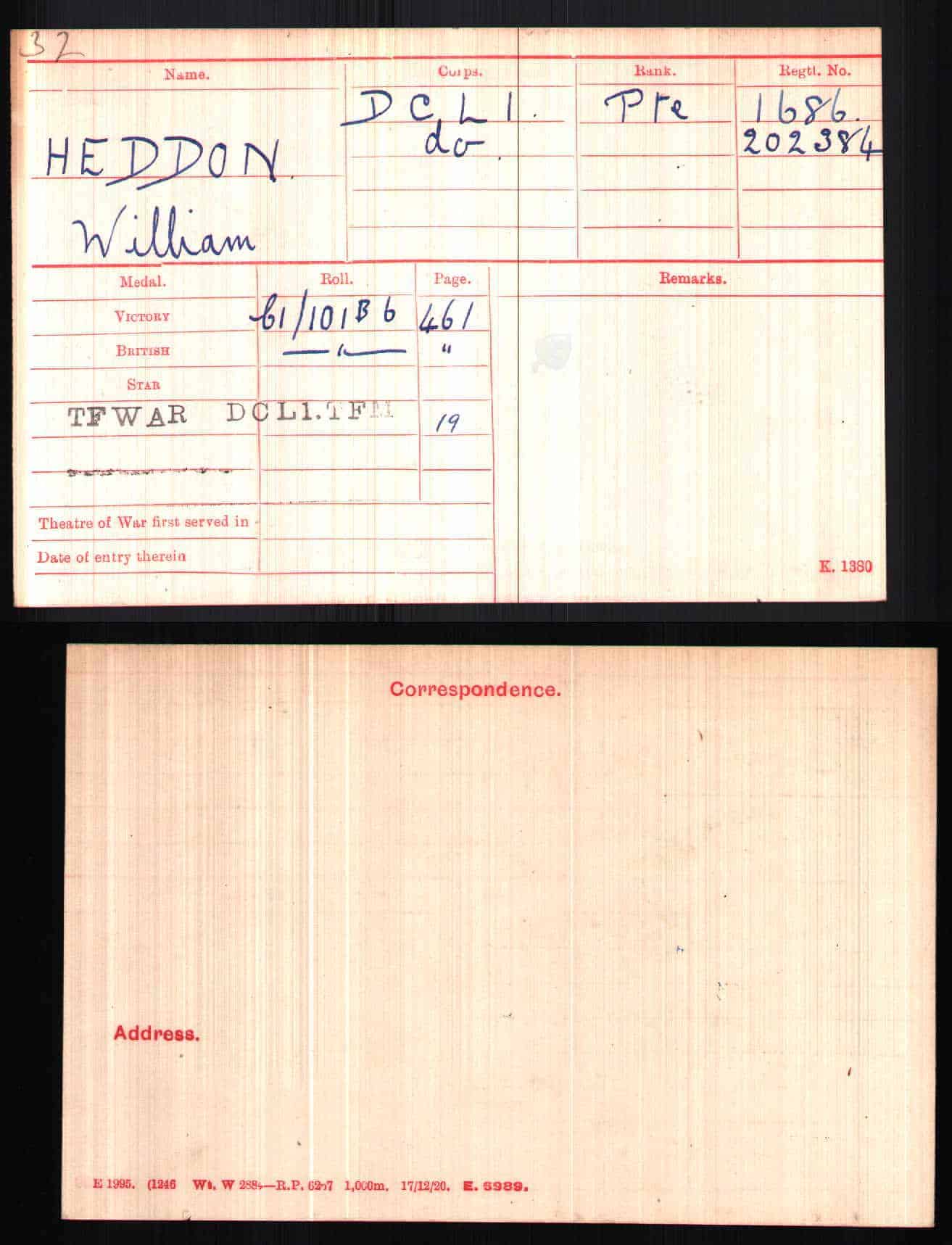
Francis Hubert Hicks
Frank was born on July 24th, 1883 to Francis and Maria Hicks at Daws House. His father was a general labourer. Frank served with the D.C.L.I.
Donald Hodge 1892-1927
Donald was born, along with his twin Brother Harold in 1892 at Thorveton, Devon to Thomas and Ellen Hodge. (Harold joined the Royal Navy and died of influenza in 1918) His Father was a Carpenter and in 1901 they were residing at Petherwin Water, South Petherwin. There is little information available for Donald until 1915 when he enlists with the Royal Engineer Corps (Regimental No 60744) at Torquay. Here he is listed as being a Tram Conductor although he is shown to be living at Rose Cottage, Daws House.
Donald survived the war, demobilising on the 10th of June 1919 and having got married on the 5th of September 1918 to Mabel Babbage, he returned to live at 36 Hartrop Road, St. Mary Church, Torquay with his wife. He died in 1927.
Percy Hodge
Percy served with the 1st and 5th Battalions of the D.C.L.I.
Edward Jasper 1885-
Edward was born at Lewannick in July of 1885 to Richard and Mary (nee Northey) Jasper. On leaving School, Edward went to work on his Uncle Edward’s farm at East Petherwin.
Just like his brother Fred, Edward enlisted at the onset of the First World War, joining Buckinghamshire Regiment. Fred was Killed in Action at Polygone Wood/Judge Copse Flanders on the 9 Oct 1917 at the age of 24. Edward himself survived the war, but very little is known of him from that time.
Arthur Jenkin 1890-1955
Arthur was born in 1890 to Ephraim and Sally (nee Johns) Jenkin at Brockle Farm, South Petherwin. His father was a farmer and farm contractor. On leaving school Arthur went into banking and by 1911 he was living at Kings Lyn, Monument Green, Weybridge and working for the Westminster Bank as a clerk.
At the outbreak of the First World War he enlisted with the Royal Fusiliers. Surviving the war, Arthur returned to his civilian life, marrying Audrey T Mardall in the spring of 1930 at St. Albans, Hertfordshire. Arthur passed away on April 24th, 1955 age 65 at Felixstowe, Suffolk.
Fred Jenkin 1886-1955
Fred was born in 1886 to Edward and Ellen (nee Trewin) Jenkin at North Hill. His father was a coachman/grocer. The family came to reside in Daws House and by 1901 Fred was working as a draper’s assistant. There is little known of Fred after this period except that at the onset of the First World War he enlisted with the Army Service Corps.
Samuel Jenkin
Samuel was possibly born in 1877 at Altarnun to Samuel and Mary Jenkin. His father was a mason and the family resided at Rooks Corner. Samuel served with the 2nd and 5th Battalions of the D.C.L.I.
Edward Neal 1896-
Edward was born in 1896 to William and Matilda Neal at Oldwit, South Petherwin. His father worked as a waggoner on Oldwit Farm. There is little known of Edward after 1901 except that at the onset of the First World War he enlisted with the Royal Berkshire Regiment.
George Kinver 1892-1970
George was born in 1892 at South Petherwin. By the 1901 census he was an inmate at Launceston Workhouse along with his Mother Mary (listed as being Single) and brothers William and Charles. In the 1911 Census he was working for James Bond at Skinnish Farm, Egloskerry as a farm labourer. He joined the DCLI as a Private. He died in 1970
William Lampin 1884
Joined the DCLI as a Private at the outbreak of world war one Regimental Number 14623. He made the rank of Segeant.
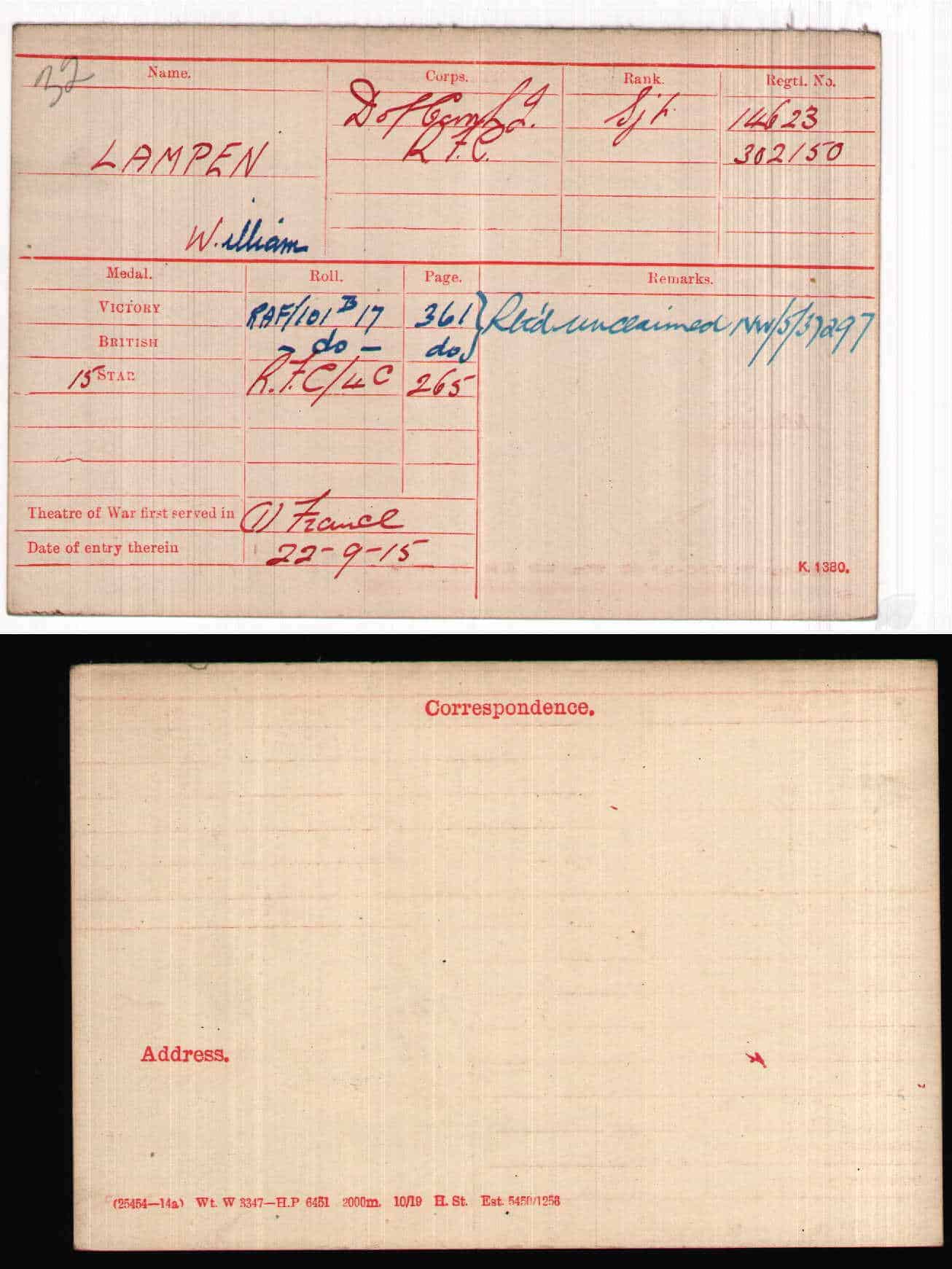
George A. Lockyer
George served in the Royal Navy
William J. V. Maunder 1879-
William was born in 1879 to Benjamin and Elizabeth Maunder (nee Herring) at Kennards House. In the 1901 census he was working as a domestic servant for a local Magistrate, Frank Bradshaw and his wife Emmeline , in Westminster London. William was a stoker with the Royal Navy.
Samuel Medland 1891-1954
Samuel was born in 1891 to Thomas and Ann Medland at Warbstow. The family being Non conformist had him baptized at home on the 8th of June 1891. His Father being an Agricultural Labourer moved the family to south Petherwin before 1901, taking up residence in the village. By 1911 Samuel was living at an address in Race Hill, Launceston and working as a Grocers Assistant.
He enlisted with the Army Service Corps (Regimental No. S4/129476) in 1915.
(The unsung heroes of the British army during World War One- the ASC, Ally Sloper’s Cavalry. Soldiers can not fight without food, equipment and ammunition. In the War, the vast majority of this tonnage, supplying a vast army on many fronts, was supplied from Britain. Using horsed and motor vehicles, railways and waterways, the ASC performed prodigious feats of logistics and were one of the great strengths of organisation by which the war was won.)
His brother was Charlie who also joined up but with the DCLI but was killed in action in 1916.
After the War he married Ivy Emmeline Millman on the 27th of January 1920 at Peter Tavy Church, Devon. They had no children. He died on the 3rd of February 1954 at his home in Peter Tavy.
William Medland 1896-1931
William was born on the 21st February 1896 to Thomas and Ann Medland in South Petherwin Village. Thomas who came from Poundstock was an Agricultural Labourer. On leaving school, William went to work at Trethevy Farm for Edmund Turner as a Cowboy.
On the 9th of April 1913 he joined the Royal Navy as boy serving upon HMS Vivid I.
HMS Vivid was the Navy barracks at Devonport. It was commissioned in 1890, and operated as a training unit until 1914. The base was renamed HMS Drake in 1934, and as such is still existing as the name now refers to all of Her Majesties Naval Base Plymouth.
During the period 1912 – 1923 other, nominal bases were established for personnel on detached duty and attached to HMS Vivid for accounting purposes also named Vivid. Vivid II and III were for sections within Devonport, while Vivid IV was used for personnel at Falmouth (Cornwall) and then Queenstown in Southern Ireland from 1922 to 1923. Vivid V was used for Milford Haven(South Wales).
His first ship that he served on was the ‘HMS London’ from September 1913 until the 26th of October 1916. In that time he had risen to Able Bodied Seaman.
Following the outbreak of War the squadron was attached to the Channel Fleet before London was detached in March 1915 to participate in the Dardanelles Campaign. She remained in the Mediterranean in support of Italian Navy operations in the Adriatic Sea until October 1916.
Much of the rest of the war William spent with HMS Vivid until 1919 when he spent 6 months aboard ‘HMS Cornwall’.
For the rest of his Naval career he spent time on various ships including ‘HMS Impregnable’ but in July of 1928 he was invalided out with a bad wrist Joint.
Looking at the records he may have passed away 3 years later whilst living in Redruth.
William Medland service record.
Samuel T Paddon 1870-1932
Samuel was born in 1870 at Pyworthy, Devon.
In 1911 he was living in the village with his wife Eliza, daughter May, son Percy, grandson Warne Bennett and his brother in law Elijah Bennett. By this time he was no longer in the Royal Navy and was living of his Naval pension. At the beginning of World War One he rejoined the Royal Navy as a Chief Petty Officer. No record survives of his wartime record. He died living near Stratton in 1932.
Frederick Prout 1889-1948
Frederick was born in 1889 to Thomas and Isabella Prout at Daws House, South Petherwin. He had five older brothers and sisters and one younger sister. His father was a mason. He joined the 30th Company Royal Engineers as a carpenter based at Epinstone Barracks, Commercial Road, Plymouth enlisting at Launceston on the 10th of February 1910 (Regimental number was 19847). In August of 1914 he was posted in South Africa but returned to the western front later that year and received a wound to the head in December 1914. In June 1918 he received another wound when a shell landed near his position, causing an injury to his left knee. He continued to serve on the western front through out the war, even taking up guard duties in Cologne, Germany at the Wars end.
By the time of his discharge through disability he had risen to Sergeant.
William Prout 1887
William was an elder brother to Frederick Prout and was born in 1887 to Thomas and Isabella Prout at Daws House, South Petherwin. He joined the 1st Grenadier Guards Regimental Number 14025 and served throughout world war one.
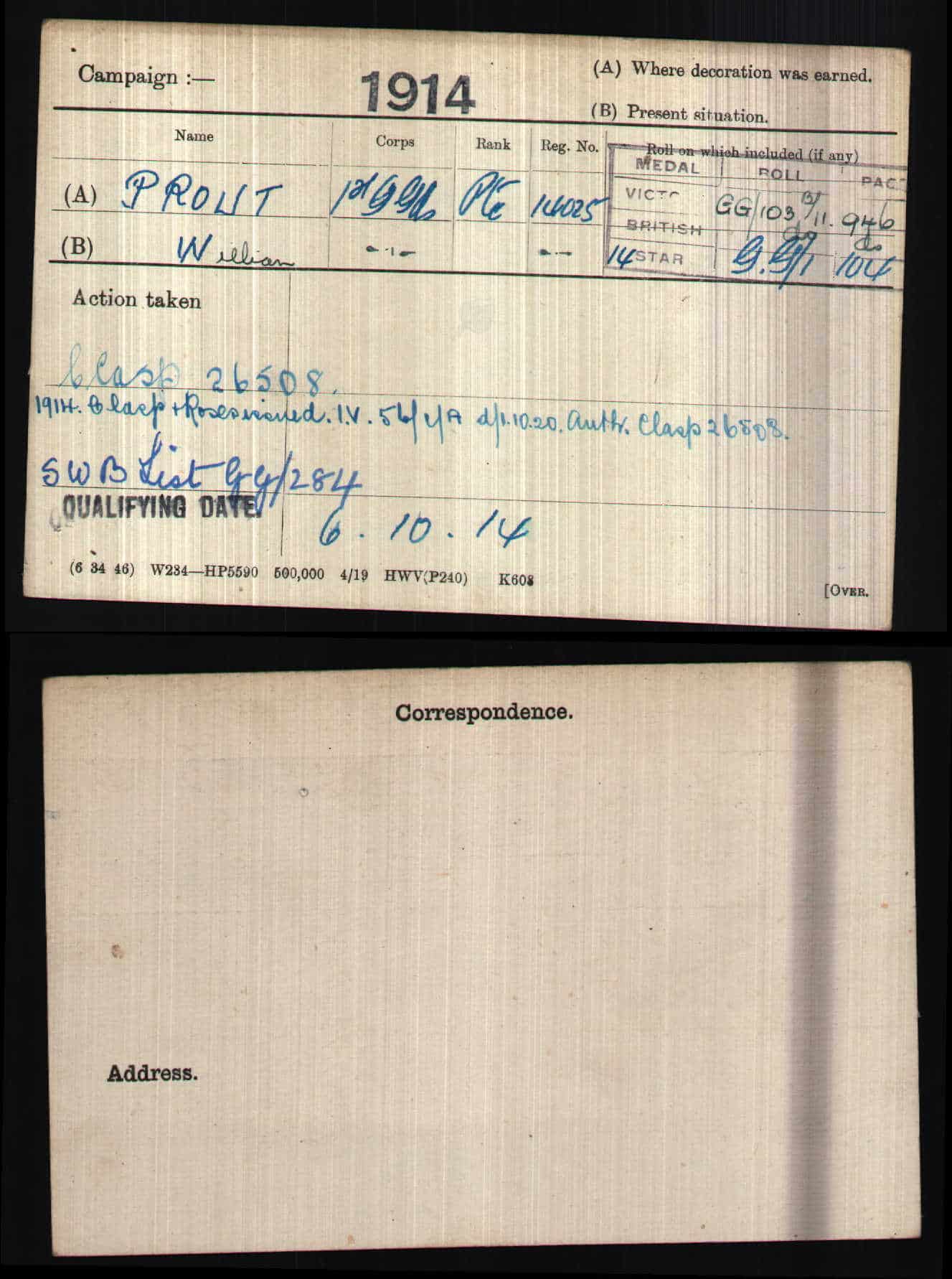
Sidney Owen Rawling 1893-1956
Sidney was born in March 1893 to John and Caroline (nee Nickell) Rawling at Oldwit Farm, South Petherwin. His father was a farmer and local Rural Councillor. He was educated at Mr. Thomas Ball’s school at ‘Devonia,’ Dunheved Road, where Sidney was a boarder. Sidney latter went on to obtain his D.Sc.. His father died in 1912.
Sidney enlisted with the Royal Fusiliers at the onset of the First World War serving with the 21st as a corporal (Regimental no. 3189). He later transferred to the Royal Engineers as a 2nd Lieutenant. (Regimental no. 106406). He received his discharge on November 24th, 1917 which by this time he was with the Royal Garrison Artillery.
Sidney married Doris Mary Roughley in the of June 1925 at Liverpool and they had two children setting up home at Edmonton. In 1925 he wrote an article in ‘The Journal of Physical Chemistry,’ along with J. W. Glassett entitled ‘The Reaction between Potassium Persulphate and Potassium Iodide in Gelatin Sols.’ In 1933 he authored ‘Infra-Red Photography,’ possibly the first book on the subject.
Sidney passed away at St. Thomas Hospital, Lambeth on November 2nd, 1956. He and his wife were then living at Hutton, Essex.
Thomas Charles Robbins 1892-1970
Thomas or Charles as he was known was born on November 23rd, 1892 to John Harper and Selina (nee Wickett) Robbins at Trevadlock near Lewannick. His father was a general labourer but died when Charles was just two in 1894. His mother who was a dressmaker moved the family to Trecrogo and on leaving school, Charles worked as a stable boy.
Charles enlisted with the Duke of Wellington’s (West Riding) Regiment (Regimental no. 45479) on October 18th 1915. He was discharged on January 8th 1917.
He returned to Launceston but never married. He passed away at Launceston in September 1970 age 82.
Edward Scown
Edward served with the 3rd D.C.L.I.
George Symons 1893-1979
George was born in 1893 to Samuel and Mary Symons at Beacon House, South Petherwin. Like his father, George followed into the family farming and butcher business. He joined the Devon Yeomanry (Foreign Service) 2485 at the outbreak of World War One.
He died at Holsworthy in 1979.

Richard Snell
Richard served with the Royal Navy.
Sidney L. Strike 1874-
S L Strike joined the Queen Victoria’s Rifles as a Private during world war one. Based at Hyde Park.
Leonard Truelove
There is no information on Leonard.
Lewis Braund Turner 1874-1963
Lewis was born in 1896 at Broadwoodwidger to Richard and Mary Turner (nee Braund) who also had a daughter, Mary, born in 1895. At the outbreak of war he was working at home on Botathon farm with his Father. He Joined the Devon Yeomanry as a Private 2497. Having survived the war he eventually married to Kathleen Metherell at Launceston in 1932 and continued Farming at Botathon.
Lewis moved sometime after the 2nd World War and lived at 4 Seaway Gardens, Preston, Paignton and died on the 22nd of May 1963 at Hawkmoor Chest Hospital, Bovey Tracey, Devon.
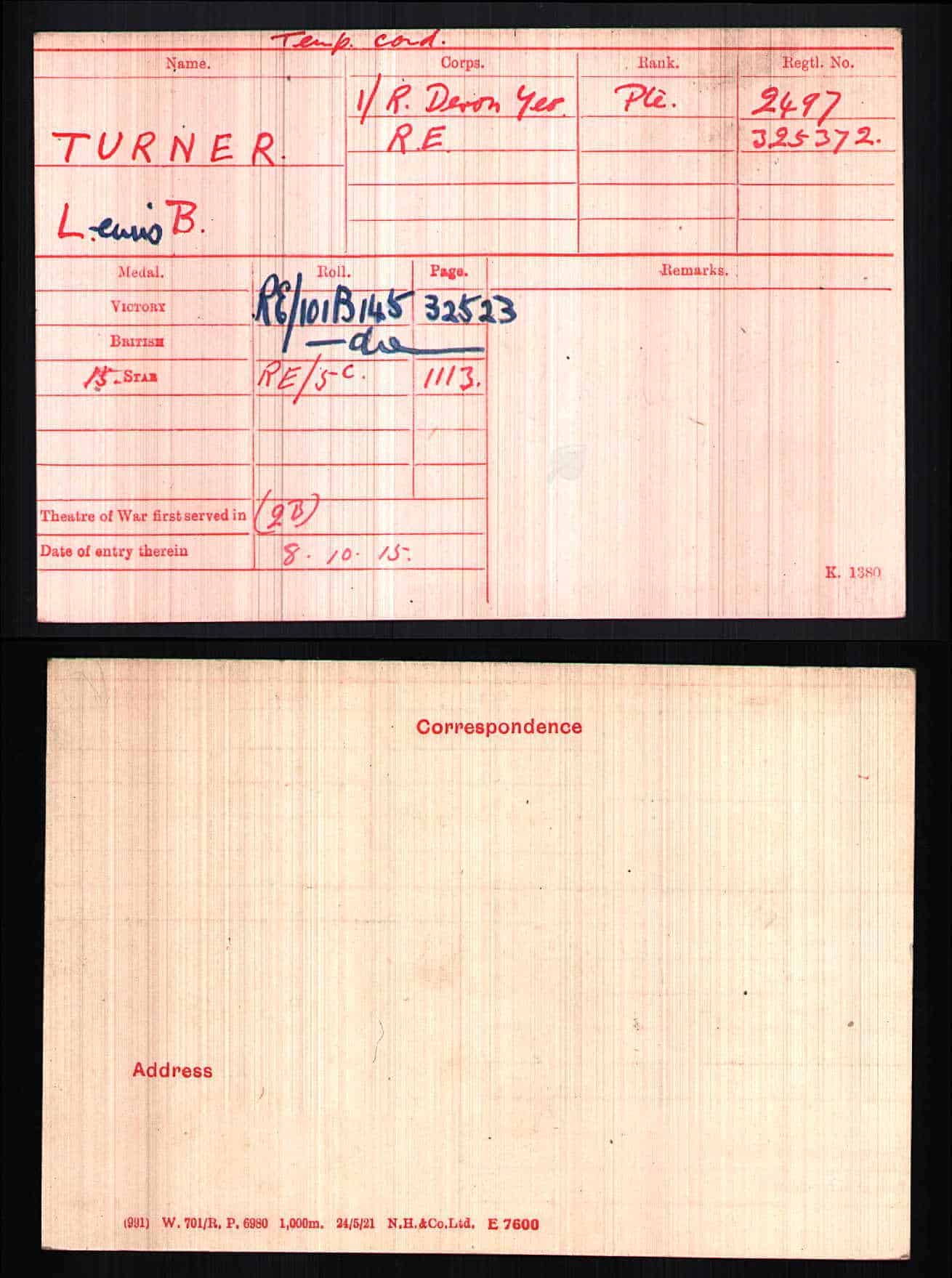
Sampson Wilton 1890-1959
Sampson was born on the 30th of March 1880 to Sampson and Elizabeth (nee Worden) Wilton at South Petherwin. His Father was a Blacksmith and Sampson followed into the business. In 1905 Sampson married Elizabeth Sowden at Barnstaple and by 1911 they were living 9 Balfour Terrace, Devonport, Plymouth and he was working as an Engine Room Artificer with the Royal Navy having joined up in 1901 (Service Number 270457).
In the early days of steam-powered warships, usually working under an Engineer Officer, an Engine Room Artificer (ERA) was a fitter, turner or boilermaker, able to read and write and was competent in the workings of engines and boilers, and trained in the maintenance and operation and uses of all parts of marine engines. ERAs were the senior maintainers and operators of all warship mechanical plant.
He served with the Royal Navy aboard many ships, continuing until at least 1920 when he is aboard HMS Indus.
Together, he and Elizabeth had three children, Albert, Sampson and Kathleen and after his discharge from the Navy the family returned to live at Church Walk, South Petherwin where Sampson died on 26th October 1959. In his will his effects of £1680 14s. 5d. Were left to Albert Wilton, Company Director and Sampson Wilton Accountant Electricity Board.
Preston Webber 1893-
John or Preston as he was known, was born in 1893 to Francis and Mary (nee Grace) Webber in South Petherwin. His Father worked as a General Labourer. On leaving school, Preston went to work in Launceston as a Drapers Assistant. He served with the A squadron of the 1st Life Guards.
He wrote a letter home at the early stages of the War to his Parents, which was published in the Cornish and Devon Post in September 1914. There is little further information on his military career although he did survive the war.
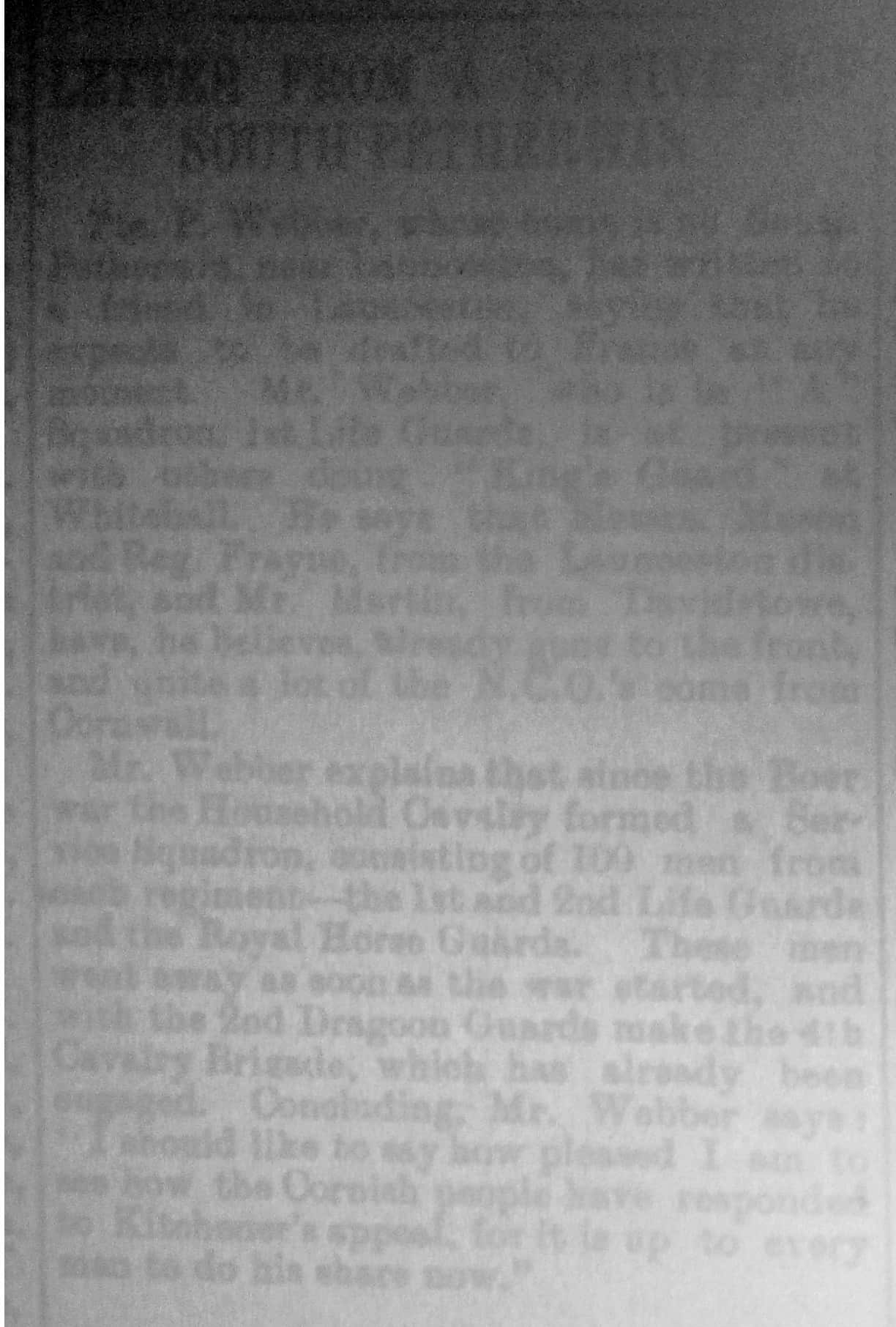
Cecil Westlake 1897-1949
With special thanks to Pamela Holt and Myra Ellacott Daughter and Niece

Cecil Westlake was the youngest of three children being born to William and Florence Westlake at Landlake Farm, South Petherwin in 1897. Like his brother Horace (Who was KIA at the battle of Loos) at the outbreak of World War One he enlisted joining the Duke of Cornwalls Light Infantry (240201) on the 29th . He served at the western front and achieved rapid promotion finally ending up as Sergeant. He was offered an Officer position but refused as he wanted to remain with his men. Cecil was Mentioned in Dispatches in 1917 (Gazette issue 30434. Mentioned In Despatches.; Deserving of special mention.) He was also awarded the Belgium Croix de Guerre 1st Class in 1918.
He was captured by the Germans when they made a powerful attack in the Leys April 12th 1918 and saw out the remainder of the war as a POW.
Due to the poor nutrition he suffered during his months of captivity he came down with Beriberi. On his release he met and married Lillian Holley in Croydon, Surrey. He never returned to live in Cornwall, instead settling in Bristol working in Hardware. He never discussed his wartime experiences, but upon his death at the early age of 51 (probably caused by him contracting Beriberi), daughter Pamela found an old diary that he kept notes throughout his internment. Below are a series of transcriptions taken from that old Diary by Brian Edward Holley in his book ‘They went away to war’ (ISBN I 85776 942 2).
Cecil’s Diary transcription.
Page 5 (or 1)
Captured 12th April at Meville. Assisted a wounded man to dressing station a distance of 2 miles. Treated fairly well. Carried wounded German another 2 miles.
Marched to (not clear, could be Marquille)
12th April. Barley water and a slice of black bread for breakfast the morning 13th 8 a.m. 13th marched to (Wari?). Carrying shells all day from the station to the village. Our airmen had bombed the station the previous night and blew up ammunition, trucks and rails.
Left work at 7 p.m. Marched to (La Heine?) Men slept like pigs in a sty. Nothing to eat all day… Breakfast next morning 14th a slice of black bread and water. Had a wash in a ditch. No soap, no towel. Dinner a drink of barley water. Rusty tin picked up. (This was to be Cecil’s only eating and drinking utensil for the rest of his captivity)
Tea time burnt barley water and a slice of bread. Slept that night as previous one. In morning 15th breakfast barley water, slice of bread. Carried shells all day.
Page 4
Still at same place. Sanitary conditions awful. Remained at nd finished up with 1/3rd .
German guards changed every 14 days. Plenty of (indecipherable) in the camp. We paid for all writing paper half a mark for a packet of five. We sent 4 cards and 2 letters a month. Several of our men escaped which caused a lot of excitement for us. The meat we (page 6) had was either horse flesh or wild boar flesh, whale or porpoise. One of our (cannot decipher) dinners consisted of black bread, peas, maize meal and horse beans.½
Adjoining field on 27.6.18 German plane brought down by one of our airman. We has been writing home for 3 months, on the 3.7.18 we were told none of it had gone.
Page 7
On 5.7.18 the men refused to go to work owing to the awful rotten dinners we had. Officer drew his revolver, all the guards loaded their rifles, but things quietened down.
12.7.18 We were gassed by (cannot decipher) gas from shells. Used blankets for gas masks. Wooden clogs issued in place of boots.
PAGE 8
We had some shirts, tor rags, pants and towels, Austrian trousers, caps (cannot decipher) and some worn outboots given to us. The bandages they used for our men now made of paper. Men were starving, broke into cook house and stole 15 loaves. The camp were punished by having their bread stopped the next day.
The following undated and without page numbers is headed ‘Our Camp’ and it seems appropriate to insert it here where it fits with the above)
It was a French farm, all buildings were partly knocked down, we slept on about 3 feet of manure. The smell was simply awful which caused a lot of sickness. We had nothing to have our meals in. I myself used an old rusty tin which had been lying in the manure heap probably for months. We had some Portuguese troops with us. We had no blankets to sleep with. And in the morning places where it rainthe farm. Men in awful condition. No clean clothes or boots. Several men died in the camp. Men were absolutely weak, dropping down faint. Impossible to say how many men died in hospital. We started with 500 men in the camp (page 5) aed were worse inside than out.
The food we received was not so good as what we should give a pig at home. It was awful, words cannot explain the condition of the men. They were catching moles and eating them. Picking up potatoe peelings from the manure heap and cooking them. If one of the Germans had two or three spoonfuls of his dinner left our boys were that hungry that they would all scramble and fight for it, and the Germans standing laughing at them. Washing in an old ditch the water absolutely black. The sickness was terrific, but still they were made to work.
PAGE 9
Another German plane brought down in flames. One man came down in a parachute. Weather is very wet. Now dinners were made of boiled beetroot.
About a 100 of our planes bombed the village of (cannot decipher looks like Santel) put the wind up Jerry. On 28.8.18 we left the farm and made our camp at (cannot decipher looks like Lesquint) .
Page 10
Men worked 8 hours every day on ammunition and ration dumps. Eighteen sergeants left for Germany arrived at (Dort?) . Lille (Fort McDonald?) . 5.10.18 (Bais??E) we left there on the march for Brussels. A distance of 80 kilometers. We marched 20 kilometers everyday.
9.10.18 entrained at (cannot decipher starts like Hal?) For Gardelegen. 19.10.18 we left a village called (Bysingham?) For (cannot decipher) Germany and we reach (cannot decipher).
Page 11
(name of place cannot decipher) where we get into a passenger train. We reach Gardelegen about 9 p.m the same day.
Next day we received an emergency parcel each, which was a godsend as our rations for the journey had been a slice of bread a day and water. On 24.10.18 we move to (Weshan? OrWerhen? Or Werbian?) An NCO camp where we get another parcel. Then every ten days we get one until the Arnistice is signed and then we get six (groceries?) Each 3 bread and a biscuit parcel. On 17th December three others and myself left the camp and proceeded to Havelberg, a nice little town where we stopped at an hotel called the Kronprinz. Of course we took our own food with us. 9:30 same evening I had a (cannot decipher) time, everything was extra special. Came back to camp next day.
On 22nd December two of our Officers visited the camp, a Major and a Lieutenant. Told us we were leaving for England on Boxing day. We went to Village theatre. Very good. Paid one mark. Christmas Day the Germans had a parade to see whether everyone had the correct clothing. Some of our boys were still away. In the afternoon went to our hotel, went back to tea came out again at six went to same hotel. Played billiards, piano playing and singing. Left camp on 27th and arrived (looks like Stettin.) Embarked on the ‘Dronning Maud’ a Danish Steamer at 9 o’clock. We had two meals on the boat. Disembarked at Copenhagen at 8 o’clock on 29th December. We went to (cannot decipher) by train. We were welcomed by the civilians more than I expected. On 30th we were issued out with khaki and each man received a bath. 6 a.m on the 31st we had a glorious time plenty to eat and plenty of singing and more than we could drink of whisky and soda.on 1st January 1919 I went to a village called (Birkerod?)
Some pleasant evenings. Left (cannot read name) for Copenhagen and went aboard ship ‘Frederick VIII’ on 7th January. The first two evenings we’ve a good concert each night. Landed Hull 10 a.m. On 11th went to Ripon 2 days.
That was the last diary entry.
